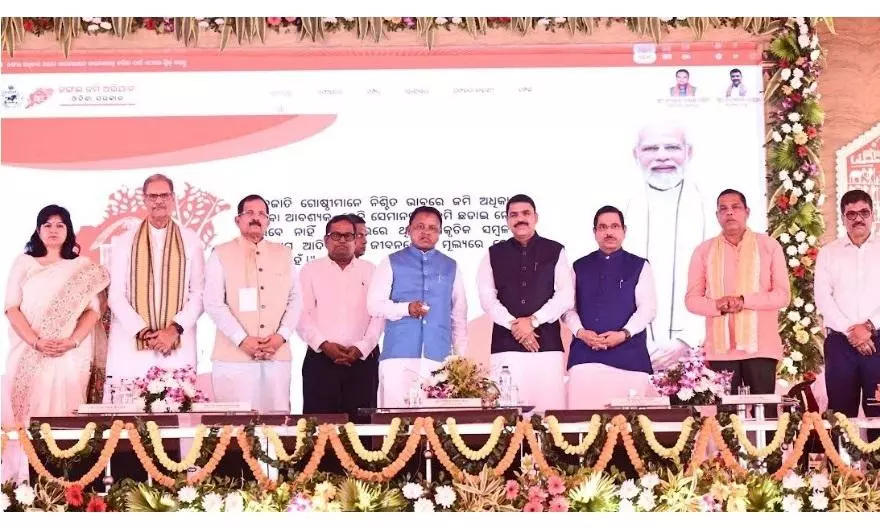Odisha CM Announces Consultations on PESA Act Implementation
The Act, which has been awaiting execution in the state for over 27 years, aims to empower tribal communities and bolster self-governance in Fifth Schedule Areas.;

Bhubaneswar: In a notable move, Odisha Chief Minister Mohan Charan Majhi announced on Friday that his government would hold comprehensive consultations with stakeholders before implementing the long-pending Panchayat (Extension to Scheduled Areas) (PESA) Act, 1996.
The Act, which has been awaiting execution in the state for over 27 years, aims to empower tribal communities and bolster self-governance in Fifth Schedule Areas.
Speaking at a large tribal gathering at Janata Maidan on the occasion of Janjatiya Gaurav Divas, commemorating the 150th birth anniversary of tribal freedom fighter Birsa Munda, Majhi criticised the previous Biju Janata Dal (BJD) government for its alleged neglect of tribal welfare.
“The previous BJD government, which ruled Odisha for over 24 years, displayed an anti-tribal attitude, ignoring the socio-economic development of tribal communities. Our government is committed to ensuring all-around development for the tribal population," the Chief Minister asserted.
Odisha is one of 10 states with Fifth Schedule Areas where the PESA Act is applicable. With the third-largest tribal population in India, after Madhya Pradesh and Maharashtra, Odisha plays a critical role in the implementation of the Act. The PESA Act empowers tribal communities with greater authority over self-governance and the preservation of their unique social and cultural practices.
Under the Act, powers and authority are to be devolved to gram sabhas and panchayats, promoting participatory governance in tribal areas. Odisha has 13 PESA districts, including six fully covered districts—Malkangiri, Nabarangpur, Rayagada, Mayurbhanj, Sundargarh, and Koraput—and seven partially covered districts such as Ganjam, Keonjhar, Sambalpur, Kandhamal, Kalahandi, Balasore, and Gajapati. Of the state’s 314 blocks, 121 have been identified as tribal sub-plan blocks.
Experts note that as a Central Act, the Union Government should have framed uniform rules for the PESA Act, similar to the Forest Rights Act, 2006. While states such as Himachal Pradesh, Rajasthan, Telangana, Gujarat, Chhattisgarh, Madhya Pradesh, and Maharashtra have notified PESA rules, Odisha is yet to follow suit. Jharkhand, meanwhile, has released a draft for public consultation.
Reacting to the Chief Minister’s remarks, senior BJD leader Pradeep Majhi refuted the allegations of tribal neglect.
“The BJD government, under the leadership of Naveen Patnaik, has undertaken numerous initiatives for the socio-economic development of tribal communities. Special Development Councils were established to uplift tribal communities, alongside measures to improve healthcare, education, and livelihoods,” Majhi stated.
The consultations announced by the CM signal a potential turning point in the implementation of the PESA Act in Odisha, promising greater empowerment for the state's tribal population.

